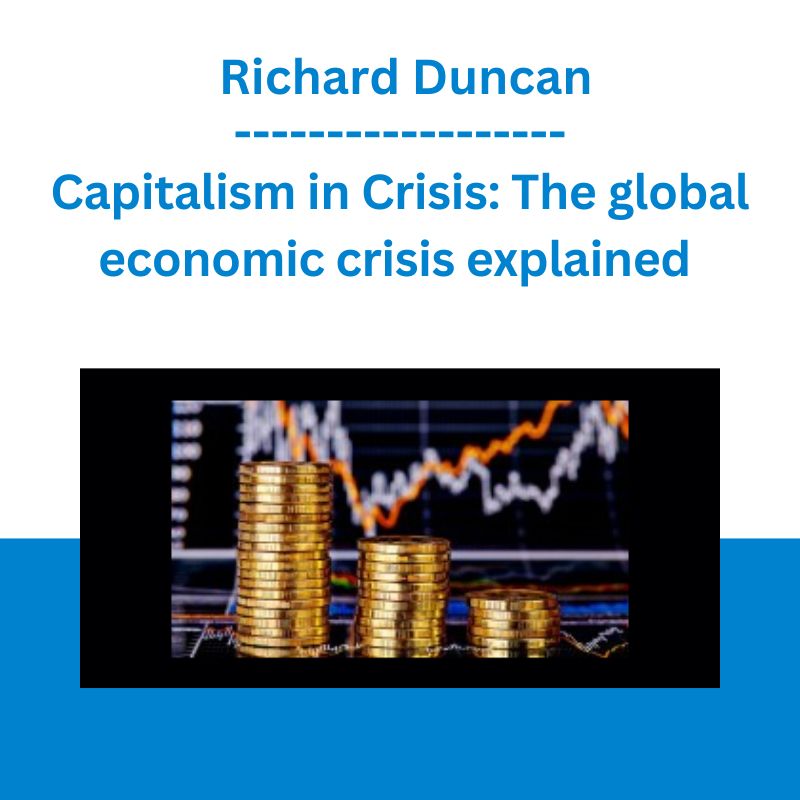*** Proof of Product ***
Exploring the Essential Features of “Capitalism in Crisis: The global economic crisis explained – Richard Duncan”
What you’ll learn
- To give the student a rock solid understanding of the greatest challenge confronting the world today.
- To provide a framework through which the student will be able to interpret developments as this crisis continues to unfold.
- To enhance the student’s ability to respond to this crisis, first as a member of a democratic society that must decide how to respond to this crisis, and second as an
Requirements
- No prior knowledge of economics is required.
Description
The global economy is in crisis and teetering on the edge of collapsing into a new Great Depression. If it does, the economic and geopolitical consequences will be catastrophic. In this global economic crisis course, Richard Duncan provides a comprehensive explanation of how this calamity came about. Topics include the abandonment of economic orthodoxy, the end of sound money and the consequences of unbalanced trade. An easy to understand analytical framework that explains all aspects of the crisis is introduced; and the rationale for the government’s policy response to the crisis is made clear. With this knowledge, the student will be well positioned to anticipate how the global economic crisis will evolve during the months and years ahead.
Richard is the author of three books on the global economic crisis and has more than 25 years of experience working in financial markets.
Take this Capitalism in Crisis now and learn about the global economic crisis.
Who this course is for:
This course is intended for everyone who needs to understand the crisis in the global economy and what is likely to happen next: investors, business managers, journalists, students of economics, students of history, all voters and, especially, policymakers.
Course content
Abandoned Priciples
- Introduction
- Restoring Stability After The Great Depression
- 1960s America: Too Much, Too Soon
- The End of Sound Money
Global Imbalance
- The Consequences of Unbalanced Trade
- Foreign Exchange Reserves
- The (Im)Balance of Payments and the US Economic Bubble
- Flaws In The Dollar Standard
The Role Of Credit
- How Credit Slipped Its Leash
- Creditopia
- Financial Sector Deregulation
- The Quantity Theory Of Credit
The Policy Response
- Perpetuating The Boom
- Inflation – Deflation
- Concluding Remarks and Contact Details
- An Introduction to HOW THE ECONOMY REALLY WORKS
Instructor
Richard Duncan
Author, Economist, Consultant, Lecturer
Richard Duncan is the author of three books on the global economic crisis. The Dollar Crisis: Causes, Consequences, Cures (2003) explained why a worldwide economic calamity was inevitable given the flaws in the post-Bretton Woods international monetary system. It was an international bestseller. The Corruption of Capitalism (2009) described the long series of US policy mistakes responsible for the crisis. It also outlined the policies necessary to permanently resolve it. His latest book, published in 2012, focuses specifically on the role that credit creation has played in this disaster. It’s entitled The New Depression: The Breakdown Of The Paper Money Economy.
Since beginning his career as an equities analyst in Hong Kong in 1986, Richard has served as global head of investment strategy at ABN AMRO Asset Management in London, worked as a financial sector specialist for the World Bank in Washington D.C., and headed equity research departments for James Capel Securities and Salomon Brothers in Bangkok. He also worked as a consultant for the IMF in Thailand during the Asia Crisis. He is now chief economist at Blackhorse Asset Management in Singapore.
Richard has appeared frequently on CNBC, CNN, BBC and Bloomberg Television, as well as on BBC World Service Radio. He has published articles in The Financial Times, The Far East Economic Review, FinanceAsia and CFO Asia. He is also a well-known speaker whose audiences have included The World Economic Forum’s East Asia Economic Summit in Singapore, EuroFinance Conferences in Miami and Copenhagen, The Chief Financial Officers’ Roundtable in Shanghai, and the World Knowledge Forum in Seoul.
Richard studied literature an economics at Vanderbilt University (1983) and international finance at Babson College (1986); and, between the two, spent a year traveling around the world as a backpacker.
Please see the full list of alternative group-buy courses available here: https://lunacourse.com/shop/










 Sovereign Man Confidential - Renunciation Video
Sovereign Man Confidential - Renunciation Video  Jesse Livermore Trading System - Joe Marwood
Jesse Livermore Trading System - Joe Marwood  Money Miracle - George Angell - Use Other Peoples Money To Make You Rich
Money Miracle - George Angell - Use Other Peoples Money To Make You Rich  Matan Feldman - The 13-Week Cash Flow Modeling - Wall Street Prep
Matan Feldman - The 13-Week Cash Flow Modeling - Wall Street Prep  Mary NurrieStearns, Rick Nurriestearns - 3-Day Experiential in Mindfulness, Yoga Meditation -AFM
Mary NurrieStearns, Rick Nurriestearns - 3-Day Experiential in Mindfulness, Yoga Meditation -AFM  George Fontanills & Tom Gentile - Optionetics Wealth Without Worry Course
George Fontanills & Tom Gentile - Optionetics Wealth Without Worry Course  Oliver Velez - Essential Strategy Of Trade For Life
Oliver Velez - Essential Strategy Of Trade For Life  Fred Haug - Virtual Wholesaling Simplified
Fred Haug - Virtual Wholesaling Simplified  Erik Banks - Alternative Risk Transfer
Erik Banks - Alternative Risk Transfer  Crypto Dan - The Crypto Investing Blueprint To Financial Freedom By 2025
Crypto Dan - The Crypto Investing Blueprint To Financial Freedom By 2025  Akil Stokes & Jason Graystone - TierOneTrading - Trading Edge 2019
Akil Stokes & Jason Graystone - TierOneTrading - Trading Edge 2019  Forexmentor - Recurring Forex Patterns
Forexmentor - Recurring Forex Patterns  Toshko Raychev - Profit System + ITF Assistant
Toshko Raychev - Profit System + ITF Assistant  Trade Like Mike - The TLM Playbook 2022
Trade Like Mike - The TLM Playbook 2022  Emanuele Bonanni - My Trading Way
Emanuele Bonanni - My Trading Way  Simpler Trading - Bruce Marshall - The Options Defense Course
Simpler Trading - Bruce Marshall - The Options Defense Course  Greg Loehr - Advanced Option Trading With Broken Wing Butterflies
Greg Loehr - Advanced Option Trading With Broken Wing Butterflies  Atlas API Training - API 570 Exam Prep Training Course
Atlas API Training - API 570 Exam Prep Training Course  Julie Stoian & Cathy Olson - Launch Gorgeous - Funnel Gorgeous Bundle
Julie Stoian & Cathy Olson - Launch Gorgeous - Funnel Gorgeous Bundle